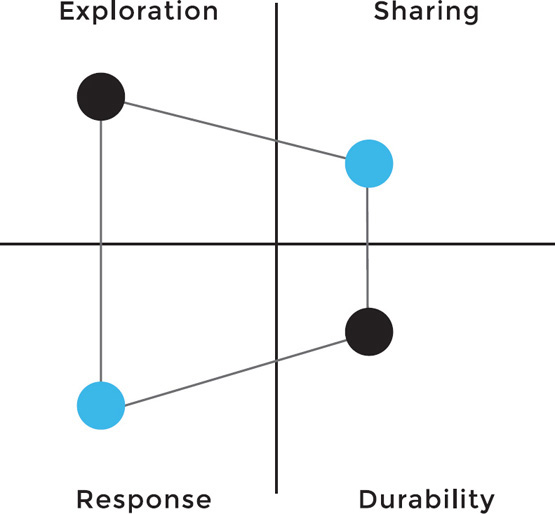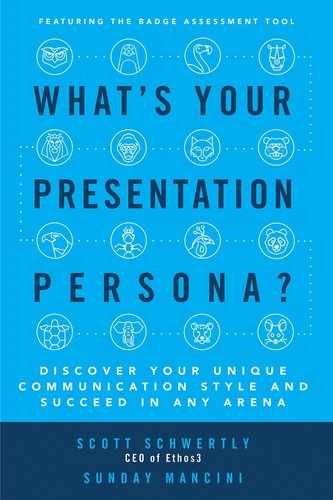Chapter 12
THE NAVIGATOR
MEET THE NAVIGATOR
Picture majestic sea turtles. They have an instinctive sense of direction, traveling on the tide from one place to another. They know exactly what they must do and how to accomplish it. If you received the Navigator persona, a similar journey takes place when you are assigned a presentation or speaking task. You have a set of internal instructions that tell you how much you should prepare and the kind of content that your audience will expect to see.
A Navigator’s strongest asset is survival. You want to accomplish your task without any major missteps. Even if you lack experience, you are willing to work hard to present in front of your audience without forgetting any important points, stumbling over your words, or seeming unprepared.
Because of this, Navigators spend a lot of time in the preparation phase. They are the kinds of presenters who tinker with their slides over and over before they feel comfortable putting them in front of an audience. And even on the day of the event, they are still thinking of things they’d like to change. Much of this stems from an inherent interest in the audience’s needs, hopes, concerns, likes, and dislikes. You are keenly aware of what it takes to deliver a great presentation, and you want to make sure that the audience sees what it expects.
This level of empathy and understanding also informs the way Navigators interact with their audience once the speech is finished. They are natural moderators for discussion and great at answering questions because of their preparedness. You may find that you prefer interacting with your audience more than being onstage in front of them, which you can use to your advantage by incorporating prepared group activities.
There are only two areas that can sweep Navigators out to sea: their onstage delivery style and their long-term memorability. Strong preparation doesn’t always indicate a natural onstage style, and too much worry can cause discomfort. You may find that you struggle with stage fright or general anxiety in front of others, either from a lack of experience or from that accursed fight-or-flight instinct. As for long-term memorability, you may not be familiar with all of the ways a presentation can be used in the future, or you might not be aware of how to create a personal platform for yourself and your message.
Either way, Navigators tend to be well-rounded personalities who are more than capable of improving their natural skills. Sometimes it’s about more than just survival. Sometimes even a familiar journey can be traveled with a little flair.
HOW YOU SCORED
So how did you score the Navigator? These results were calculated using our four-quadrant algorithm in which anything on the outside corner of the specific quadrant is considered high and anything near the main intersection is considered mid-low (Figure 12.1). Here is a simple rundown of your placement in each quadrant and how we arrived at your profile:

Figure 12.1 The Navigators
EXPLORATION
Navigators shine brightly in this quadrant, scoring in the mid- to high range. From developing the right order of your message to making sure the design elements show up clearly on a full screen, you care about the details that make a presentation worth watching. You tend to listen to conventional wisdom about how many times to rehearse and what your audience expects to hear, following this tradition rather than winging it or experimenting. For most Navigators, Exploration is about making sure all of the most important boxes are checked on the preparation clipboard.
SHARING
Perhaps because of a general feeling of “eek,” Navigators score in the mid- to low range of Sharing. You might not be comfortable with sharing long stories or telling jokes, perhaps because of your expectations of corporate or formal presentations. We encourage you to turn to TED, not your boss’s annual sales review, for inspiration in this quadrant. This might take a bit of reverse learning: forget the formal expectations of a speech and embrace the fact that storytelling and more natural speaking styles tend to be more memorable and engaging.
RESPONSE
Navigators score well in Response. It may feel strange to them to be onstage, and interacting with others and networking is more in line with their strengths. You are comfortable talking about the topic that you spent so long researching, and you may even feel gratified to get a little feedback after spending time in front of the group. This quadrant is where you are the most confident and clear, and it is where your audience feels the most impressed.
DURABILITY
Have you ever considered the long-term impact of your message? Have you thought of ways that it can be uploaded to social media or shared beyond the stage? Since Navigators score in the mid- to low range of Durability, your answer is most likely, “Eh.” You can improve your score once you understand the cyclical nature of content, such as the classic logo for recycling. Concepts you use during a talk can be used for other messages, circling and growing and thus becoming something new. Durability is what makes that happen, paired with a long-term goal or vision.
SPOTTING A NAVIGATOR IN THE WILD
Meet Aaron, a coding pro at Note-EO, a website that acts as a digital folder to organize loose notes and lists. Each quarter, a member from the development team delivers a presentation about the challenges and successes they encountered during that time. Aaron is next to deliver a presentation, and he’s freaking out about it.
Even in school, he rarely delivered a presentation outside of a few group activities. He’s a likable member of the team, but he knows that it won’t be enough to come across as confident and credible when his knees are shaking onstage. Aaron is the kind of guy who avoids karaoke and prays none of his friends get married so that he will have to deliver a best man speech.
In the face of these fears, Aaron is determined to do a good job. He works hard to create a clean-looking presentation, asking for some help from designer friends at Note-EO. He has rehearsed his main points a thousand times, until he is comfortable with the speech from top to bottom. After attending several of these meetings since he was hired, Aaron also knows that upper-level management will be expecting a particular tone and delivery. With this information, he continues to refine his rehearsal and work on his credibility.
The problem is not Aaron’s stage fright but, rather, his limited view on what a presentation can be. Even technical presentations can open the gates for larger change and improvement. With the captive eyes of his management, Aaron has an opportunity to speak personally about what he likes and dislikes at Note-EO. He could offer some suggestions that are close to his heart, and he could show that he is dedicated to the company’s long-term growth. It’s not very often that he will have a chance to speak his mind so candidly.
Aaron is thinking only about completing the task. He isn’t looking ahead. Every presentation is an opportunity to grow, share, and create change.
If Aaron delivers in front of management with his current perspective, he will be an intelligent but otherwise forgettable speaker. They will appreciate that he can clarify all of his main points and has memorized the content of his deck, but they won’t know what else is going on in this particular coder’s mind.
Navigators like Aaron should look beyond the well-trodden path. How would his presentation differ if he began with a personal story about what it’s like to code at Note-EO? What kind of change could he create if they realized the stories behind all of the numbers they see on each slide? An ideal Navigator is able to see different paths, not just one.
YOUR NATURAL HABITAT
Navigators aren’t looking for a huge, brightly lit stage. Smaller groups or one-on-one sessions are your strongest natural habitat, where you feel most comfortable engaging in discussion. Because you like to see the results of your labor—that is, positive change—you also prefer environments that encourage you to follow up with your audience, whether through e-mail or in casual conversation at lunch. While small can be great, don’t limit yourself! Navigators can make successful TED speakers who inspire full auditoriums and hundreds of thousands of viewers online.
BRAWN (STRENGTHS)
Organized
Focused
Well rounded
You are a straightforward, no-nonsense presenter who is capable of slicing through frilly content and revealing what matters most. When necessary, you can also bring a lot of energy and passion to your talk. This is because you care about the audience as a whole and deeply wish to see positive developments for each individual.
Much of your strength lies in all that extra work you put into preparation. You know you’ll be anxious onstage, so you make the effort to rehearse and perfect the flow of your talk. This dedication can cover a lot of flaws, and it helps you come across as credible in front of your audience.
TRAPS (WEAKNESSES)
Timid
Overthinking
Unengaged
Navigators with the best intentions can be brought down by working too closely on one aspect of their presentation without looking at the whole picture. This narrow focus can also affect delivery, where even the most vivacious can become anxious and timid because of their quest for perfection.
Don’t forget to add a personal, engaging touch to the overall audience experience. Too much memorization can make you sound stiff or robotic in your delivery. Consider opening your talk with a short, relevant true story. It may help loosen you up and result in a much stronger delivery.
YOUR NATURAL ALLY
Want to gain more insight into Sharing and Durability? Connect with Creators (Chapter 6) to balance your strengths and weaknesses and to see how they approach your weaker quadrants.
YOUR PREY
Because you have a well-rounded presentation style, you appeal to audiences who don’t need to see a Broadway show every time they sit down to watch a speech. Your prey are those people who love straightforward, concise information delivered by an everyman presenter, especially when they recognize all the hard work that you put into the design and content of your presentation.
YOUR PREDATORS
You may find it a struggle to inspire or motivate personas that do expect to see something new. Attention spans are short, and even the most receptive audience will have a hard time staying invested if your delivery style is burdened by too much information and few highlights. Even though the concept of “corporate” may be etched deeply in your mind, people are still people. They are driven by their own impatience and desire to be amused.
FIVE DOS AND DON’TS
DOS
1. Consider using an unexpected theme or metaphor within the content of your presentation to show that you went above and beyond the assignment itself.
2. Get creative and become more invested in your presentation by relating and sharing real-life stories that tie into your message.
3. Add some variety by using the entire stage. Stay active, not stationary, while in the spotlight.
4. If you are performing in front of a large group but you feel more comfortable in a small group setting, then learn how to make eye contact with a few key people in the front rows during your talk to simulate that small setting.
5. Practice your speech in a feedback-rich environment, especially with people who are more invested in you than in the presentation. Once you’ve finished, ask them, “Did I come across as too timid?”
DON’TS
1. Don’t rely solely on data to support the main points of your presentation. Include some interesting story-based elements.
2. Don’t focus too much on the content or design of a specific slide, but rather focus on the presentation as a whole. Don’t obsess over the small details.
3. Don’t be held back by fear or insecurity; invite more people to see your presentation. You never know who could benefit from your positive message with a long-term change of mind.
4. Don’t put your audience to sleep with an uneventful presentation, Instead, include media enhancements, props, movement, or anything else to liven up your natural straightforward style.
5. Don’t just challenge your audience with a call to action. Be sure they are aware of the benefits of listening to your good advice.
THE IDEAL NAVIGATOR
There is no such thing as a bad persona. There are only areas to improve on within your range of strengths and weaknesses. With that in mind, what do ideal Navigators look like?
1. They think outside of the norm to make their presentation more engaging and unexpected while onstage. They might consider using props, videos, or other creative aids to help tell their story in a unique way.
2. They do more than just get the job done. They use a presentation as an opportunity to grow their message and their own abilities.
3. They look beyond their initial speaking assignment, and they find creative ways to make their message stick such as leaving handouts for the audience members and reaching out via social media and e-mail newsletters.
Let’s revisit our favorite coder, Aaron, who is anxiously getting ready to deliver a quarterly presentation to his higher-ups. What happens when he refines his ability and becomes an ideal Navigator?
1. He worries less about matching the style of his peers, and he develops his own unique voice.
2. He focuses on his own specific challenges at Note-EO, and he develops a call to action that clearly demonstrates how the company could improve.
3. He uses this presentation as a chance to provide insight into his department, far beyond the data in his slide deck.
There is so much more to presenting than going with the flow. Ideal Navigators travel further than their instinctive path. Instead, they venture into new territory. Like your sea turtle mascot, you are fully prepared for anything that comes your way with a thick shell of rehearsal and preparation to help you. All you need is a fresh view of what your message is capable of achieving with a little imagination and more purpose. Take a risk! Make your message unconventional and loosen those corporate, traditional shackles.


